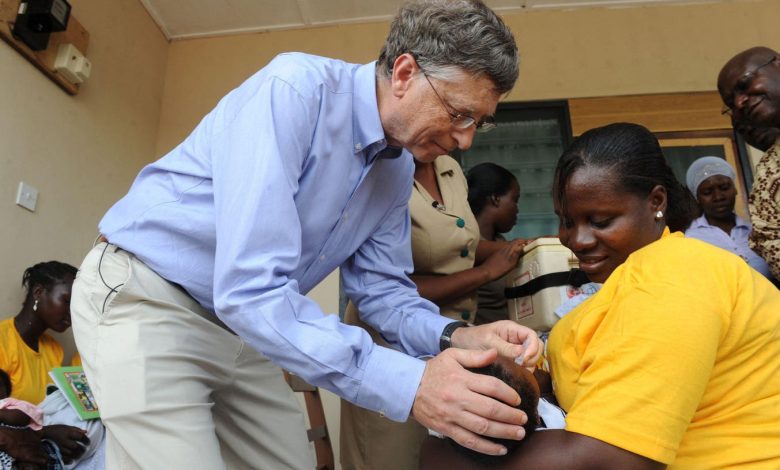Why $500 Million In U.S. Aid Cuts Threatens Global Black Motherhood

Bill Gates gives to a child a rotavirus vaccine in Ghana.
Few issues in global health make the stakes clearer than childbirth and Black maternal health. When a U.S. rescission package cuts $500 million earmarked for USAID family planning and reproductive health programs, the results can be far reaching. It lands in packed maternity wards from Lagos to Gaborone, in supply rooms where oxytocin vials are already in short supply, and on the balance sheets of multinationals that depend on a stable, healthy workforce.
How Reproductive Health Funding Cuts Create Medical Care Chaos
According to Mihir Mankad, director of global health advocacy and policy at MSF USA, the rescission has particularly devastated the medical community abroad.
“Humanitarian and medical groups have been left scrambling to carry out lifesaving services without money, staff, or certainty about what comes next,” Mankad said. “Doctors don’t know what to tell their patients when they ask where they’ll be able to continue their HIV or tuberculosis care.”
The proposed rescission would claw back half a billion dollars entirely from family-planning and reproductive health accounts. No exemption shields safe delivery kits, contraceptives or the mentorship programs that empower local nurse midwives to become clinical leaders.
According to Mankad, the cuts have created devastating consequences for the world’s most vulnerable populations.
“The revocation of nearly $500 million for family planning and reproductive health services is particularly devastating, given that the US government previously provided more than 40 percent of global support in this area,” Mankad said. “This decision crystallizes the significant service gaps that have emerged in the wake of the U.S.’ abrupt withdrawal of funding for these critical programs in January.”
Nurses give aid to a pregnant woman before delivering a baby at the maternity ward of the central … More
Private Philanthropy Scrambles to Fill the Maternal Health Void
Private philanthropy is scrambling to fill the void. The Gates‑backed Beginnings Fund, also $500 million, will target 10 African nations with the goal of improving the quality of care for 34 million mothers and their infants and saving the lives of 300,000 mothers and newborn babies by 2030.
Matching dollars, however, is not the same as matching reach because one operates on a multiyear venture model, and the other has long underwritten national health budgets at scale. Maternal mortality remains worst where women of African descent predominate. The African region records 448 deaths per 100,000 live births, and even though progress has been made, it’s been slower than desired. These statistics are not abstract. Each death severs family income streams, depresses local consumption, and deepens intergenerational poverty.
For investors tracking frontier markets, the numbers should jolt. The United Nations Population Fund estimates that every dollar invested in modern contraception cuts pregnancy-related medical costs by $1.47. Put differently, the threatened rescission destroys a stream of avoided costs that would otherwise exceed the outlay itself. Add workforce participation gains and education dividends and the net present value climbs further and the operational risks are equally concrete.
Supply Chain Lessons: How Health Crises Disrupt Global Business
U.S. firms with African supply chains learned this during Ebola and COVID‑19. Procurement delays spiked when nursing staff fell ill or walked out in protest of unsafe conditions. If maternal deaths rise, skilled labor attrition will follow.
The domestic aftermath of this is equally loud. Black women in the United States die in pregnancy at 49.5 per 100,000 live births, which is more than double the national average, according to the CDC. These parallel crises, domestic and global, should sound alarms in corporate risk management departments.
Boardrooms should treat the rescission as a contingent liability because multinationals already report climate risk, but a reproductive health risk is its understudied sibling and is equally capable of causing a rupture in operations. Maternal deaths destabilize workforces by removing experienced employees, triggering absenteeism as families grieve, and creating labor shortages that cascade through global supply chains. Poor maternal health outcomes also trigger workforce attrition, supplier instability and market contraction, which are the same operational vulnerabilities that climate events create.
Why Global Black Maternal Health Is an Economic Growth Issue
Global Black maternal health sits at the intersection of public health, human capital and economic growth. Foreign assistance typically represents approximately only 1 percent of the US’ federal budget but saves countless lives around the world. A half a billion dollars is budget dust on Capitol Hill, yet it equals the annual obstetric supply bill for dozens of third-world countries. To cut it is to leave the world’s most vulnerable mothers paying the price for a political compromise they never made.





